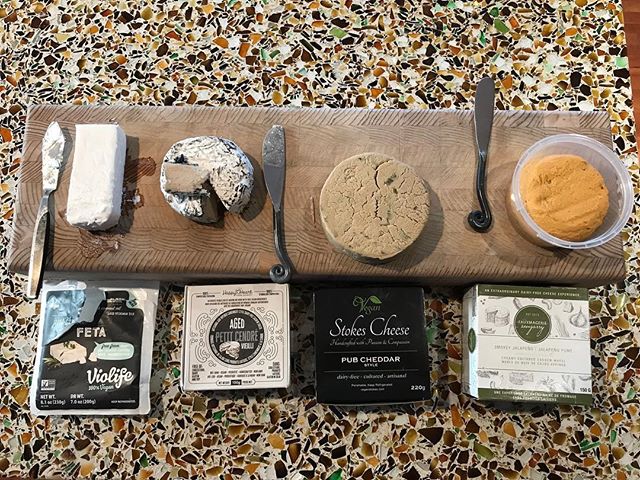Finding satisfying plant-based replacements for dairy cheese often arises as one of the biggest stumbling blocks in the path to going vegan, and until recent years the vegan cheeese options often left consumers disappointed.
That’s changing as brands continue to improve existing products and develop new ones that come closer than ever before to replicating the flavor and mouthfeel of dairy cheese, and sales trends reflect those changes.
US sales of plant-based cheese rose 43% to $124 million in the year ending in June 2018, according to Nielsen and the Plant Based Foods Association. Globally, sales of vegan cheese are on track to rise 7.7% annually through 2023, according to a report from Research and Markets.
Trends fueling the growth include a rise in veganism, a growing understanding of lactose intolerance and expanded use of non-dairy cheeses in snacks and baked goods, the report says.
One of the biggest-selling vegan cheese brands is 10-year-old Daiya, which launched with two varieties of plant-based cheese and now sells 23 in four categories – Shreds, Slices, Farmhouse Blocks and Cream Cheeze Style Spreads, said interim CEO Michael Lynch.
The Canada-based company, which calls its products “cheezes,” was founded by friends Andre Kroecher and Greg Blake, both of whom were passionate about promoting a plant-based lifestyle with innovative new products that make it easier for consumers to make changes.
The brand has since expanded into other plant-based product lines including Greek yogurt alternatives, frozen pizzas, boxed mac-and-cheese, desserts and salad dressings. In addition to being vegan, Daiya products are also free of gluten and soy.
“Consumers are always looking for taste options that they are familiar with but also excited about new offerings,” he said. “We are seeing a growing interest in spicy flavors as well as global flavor and ingredient offerings.”
Other fast-growing vegan cheese brands are attracting attention from investors, including Kite Hill which recently raised $40 million in new venture capital funding which it will use to boost production to meet rapidly rising demand, CEO Rob Leibowitz said recently.
The brand was created by chef Tal Ronnen and its cheese are available in select restaurants as well as retail channels, and it will use part of the funding to expand further into foodservice, where demand for vegan cheese continues to grow.
Another growing brand that has attracted investors and consumers is Miyoko’s Kitchen, which also aims to expand into foodservice in the coming months.
The brand represents another tale of demand outstripping expectations and fueling faster-than-expected growth. Founder Miyoko Schinner launched the brand with trepidation after an earlier vegan food venture ended in disappointment, and her initial plan was to create a small vegan cheese shop and e-commerce business.
Instead, her cultured nut-based products won national fans and she saw a way to build a bigger business that would further her mission of advocating for animals and shifting people away from animal-based dairy to plant-based alternatives.
The brand won $9 million in new funding last year, moved into a new 30,000-square-foot facility and recently began participating in the TERRA Accelerator, a program that has paired it with food giant Nestle. Miyoko’s will use the program to learn methods for accelerating growth in both the retail and foodservice channels, while Nestle will look to Miyoko’s and two other plant-based startups for entrepreneurial insights.
Other growing vegan cheese brands including Follow Your Heart, Violife, Treeline and Field Roast’s Chao are also expanding their presence in the increasingly competitive field.
Each is carving out a niche and finding fans with signature flavors and styles, and, while they’ve long been the option for vegans and lactose-intolerant consumers, they’re also increasingly appealing to omnivores looking to add more plant-based alternatives into their diets.
“Vegans, and traditional consumers alike are looking for better-for-you options that aren’t only plant-based, but ‘swapworthy,’” said Daiya’s Lynch. “When it comes to dairy-free cheese, consumers are looking for a product that tastes just like dairy-based cheese.
“We’ve seen competition in this industry increase over the last decade, but we see it as a positive thing for our brand because competition in the space is what is driving new options for our consumers.”
____________________________________________
If you enjoyed this article, sign up for Restaurant Smartbrief to get news like this in your inbox, or check out all of SmartBrief’s food and travel newsletters as we offer more than 30 newsletters covering the food and travel industries from restaurants, food retail and food manufacturing to business travel, the airline and hotel industries and gaming.
